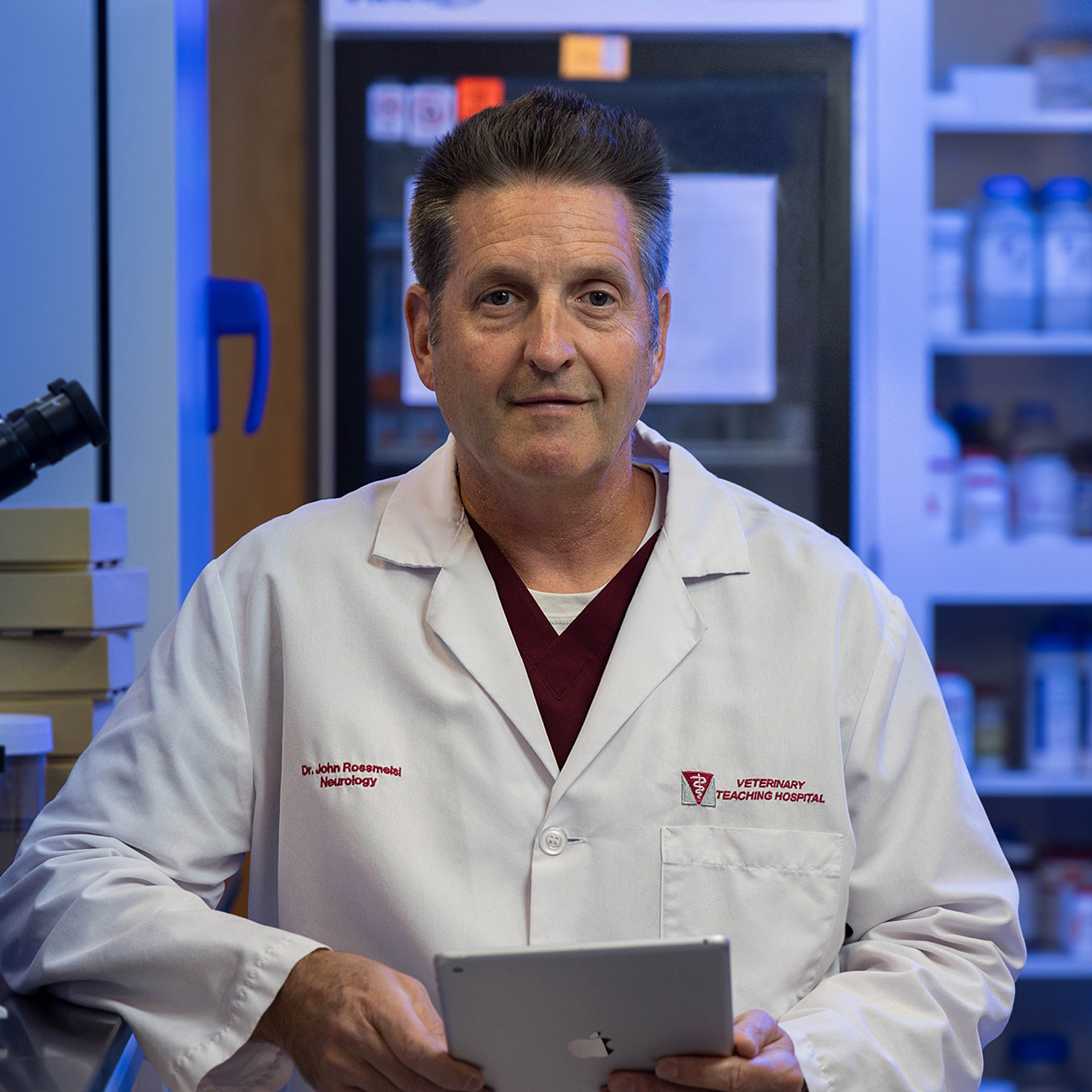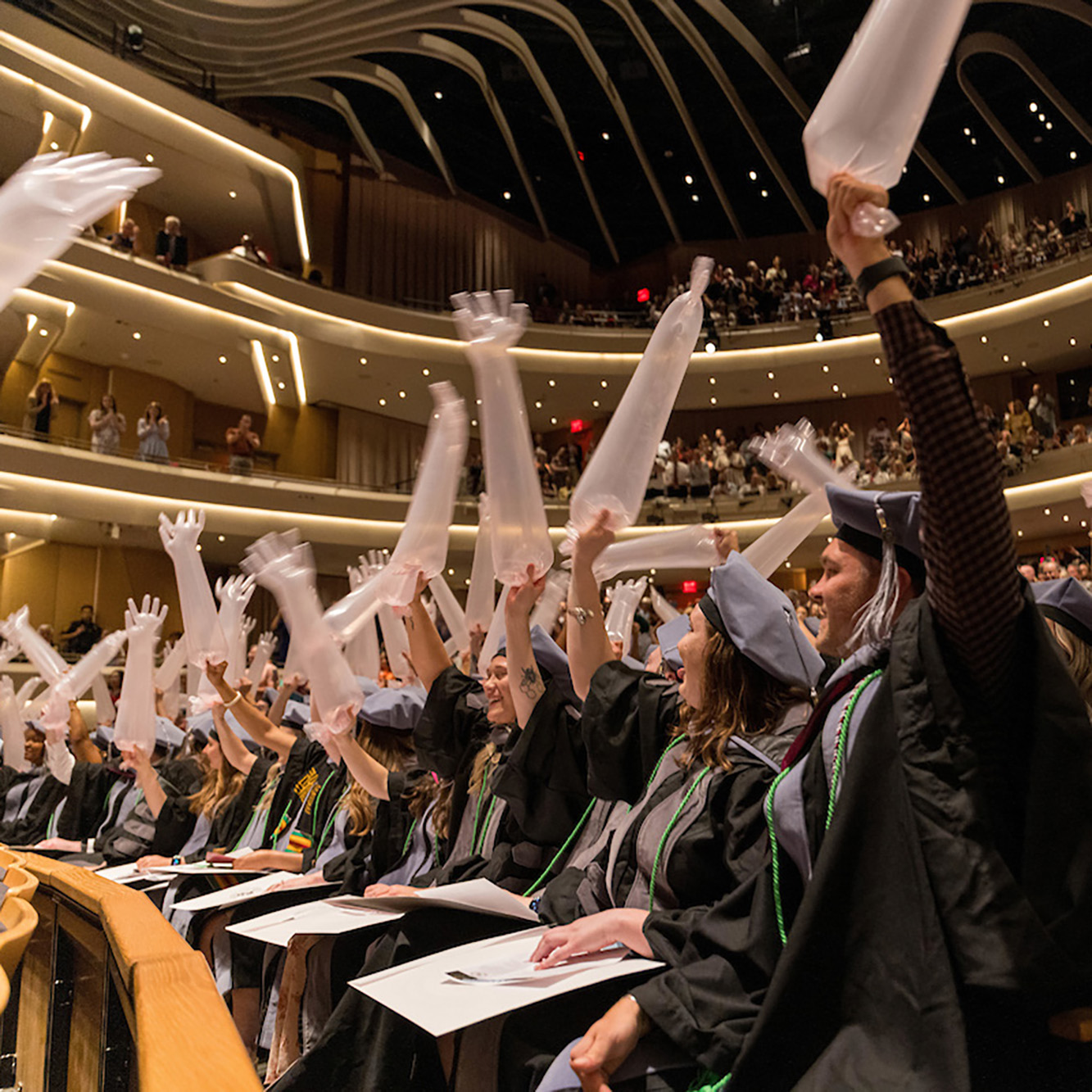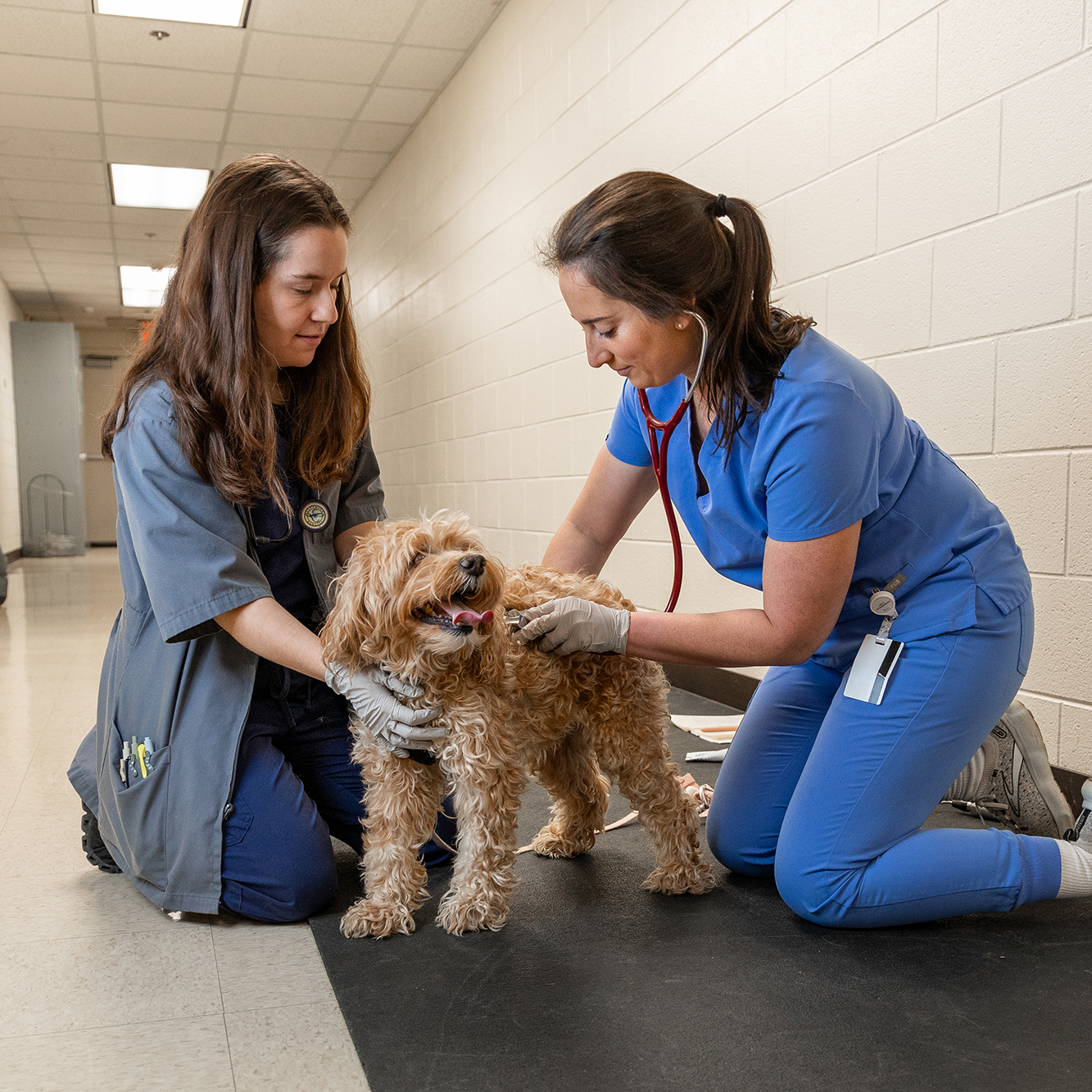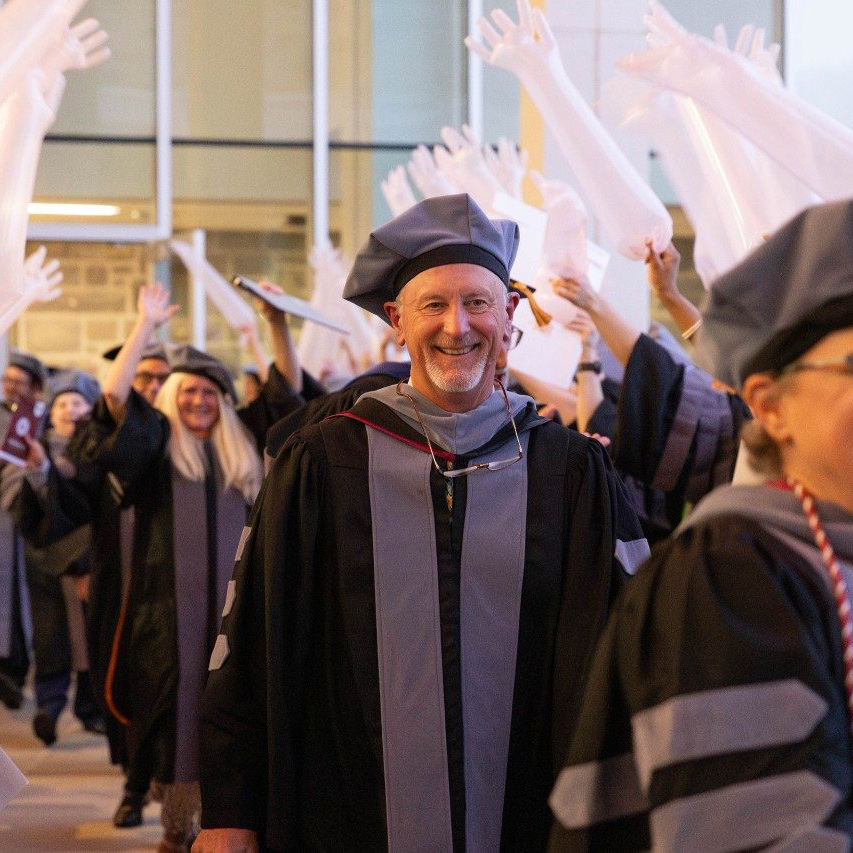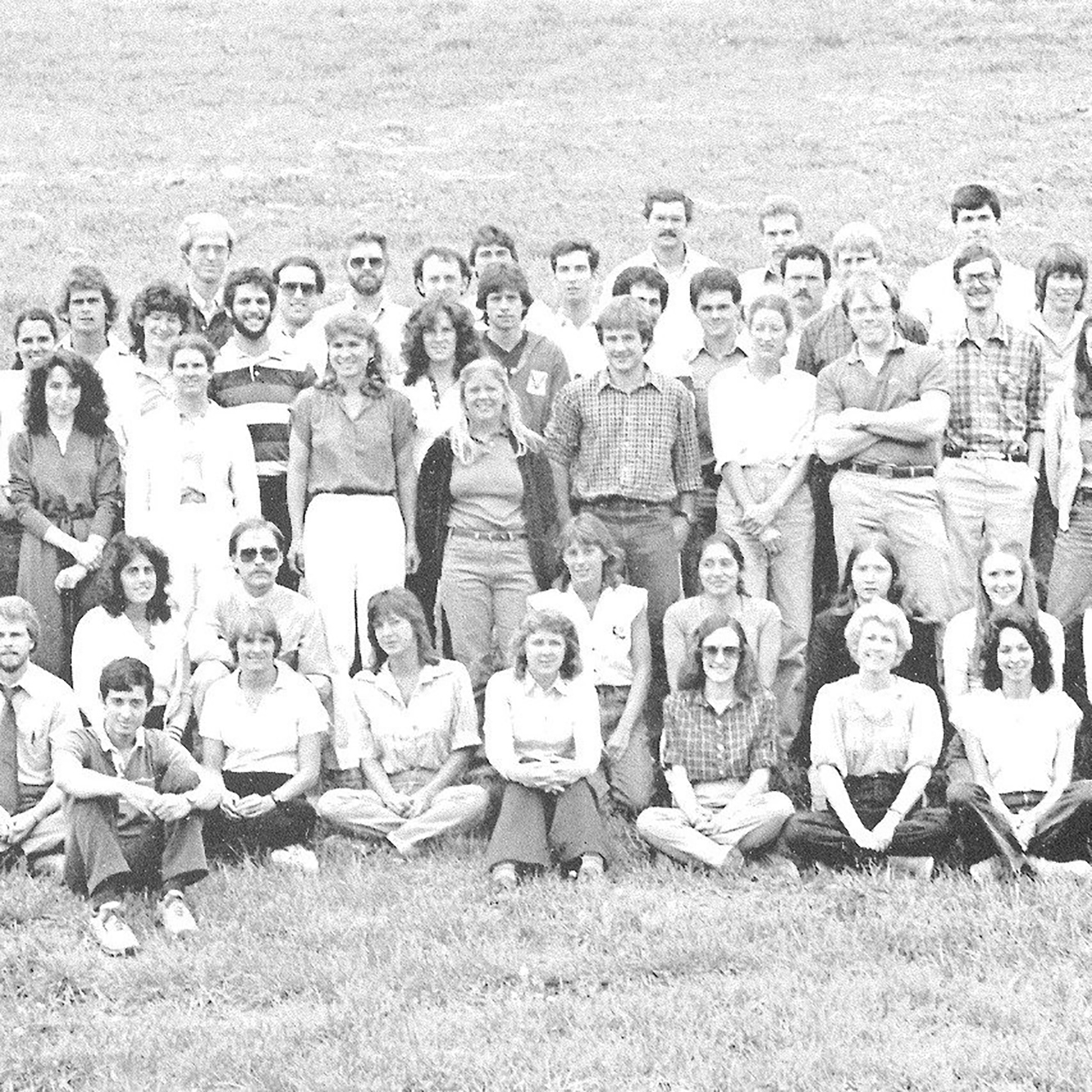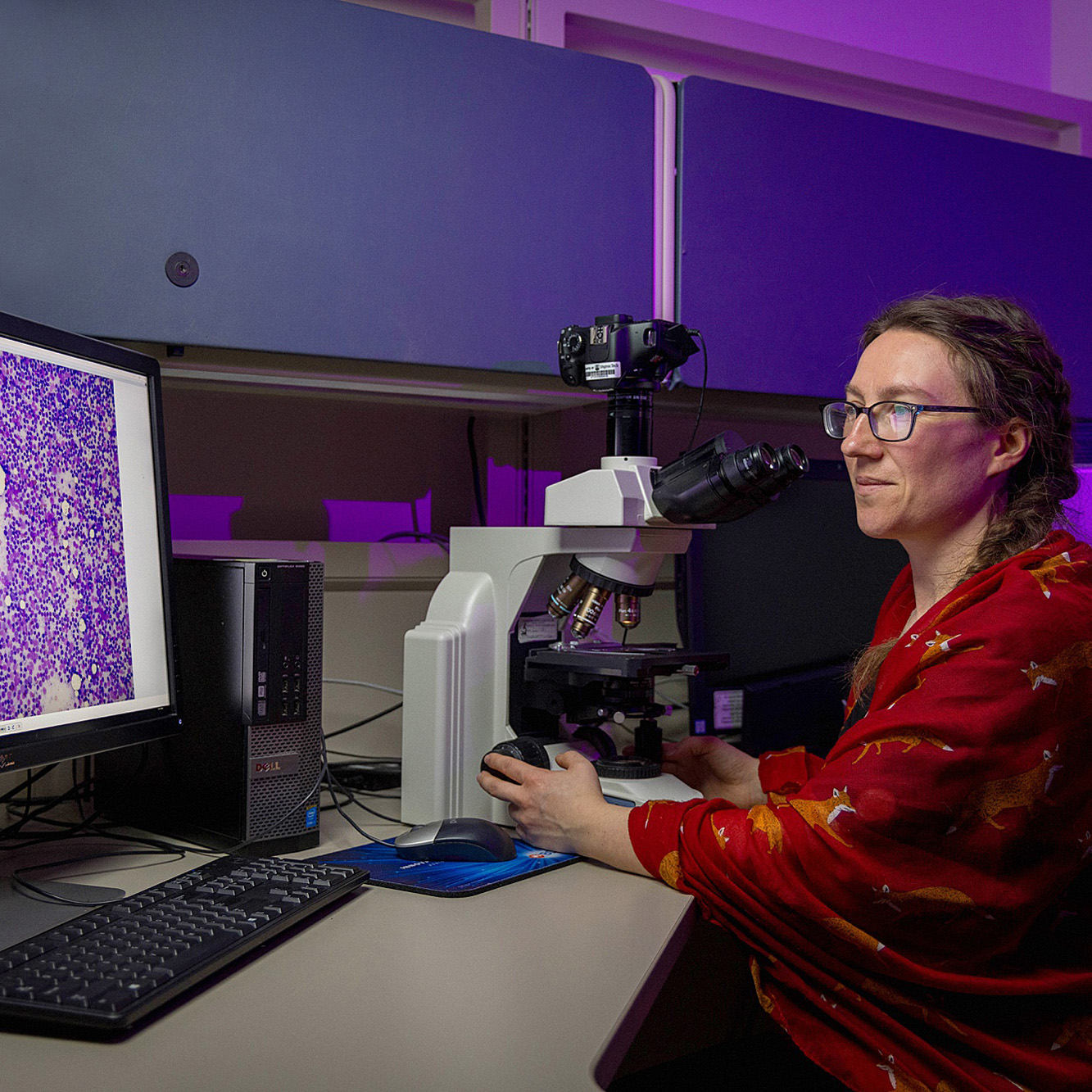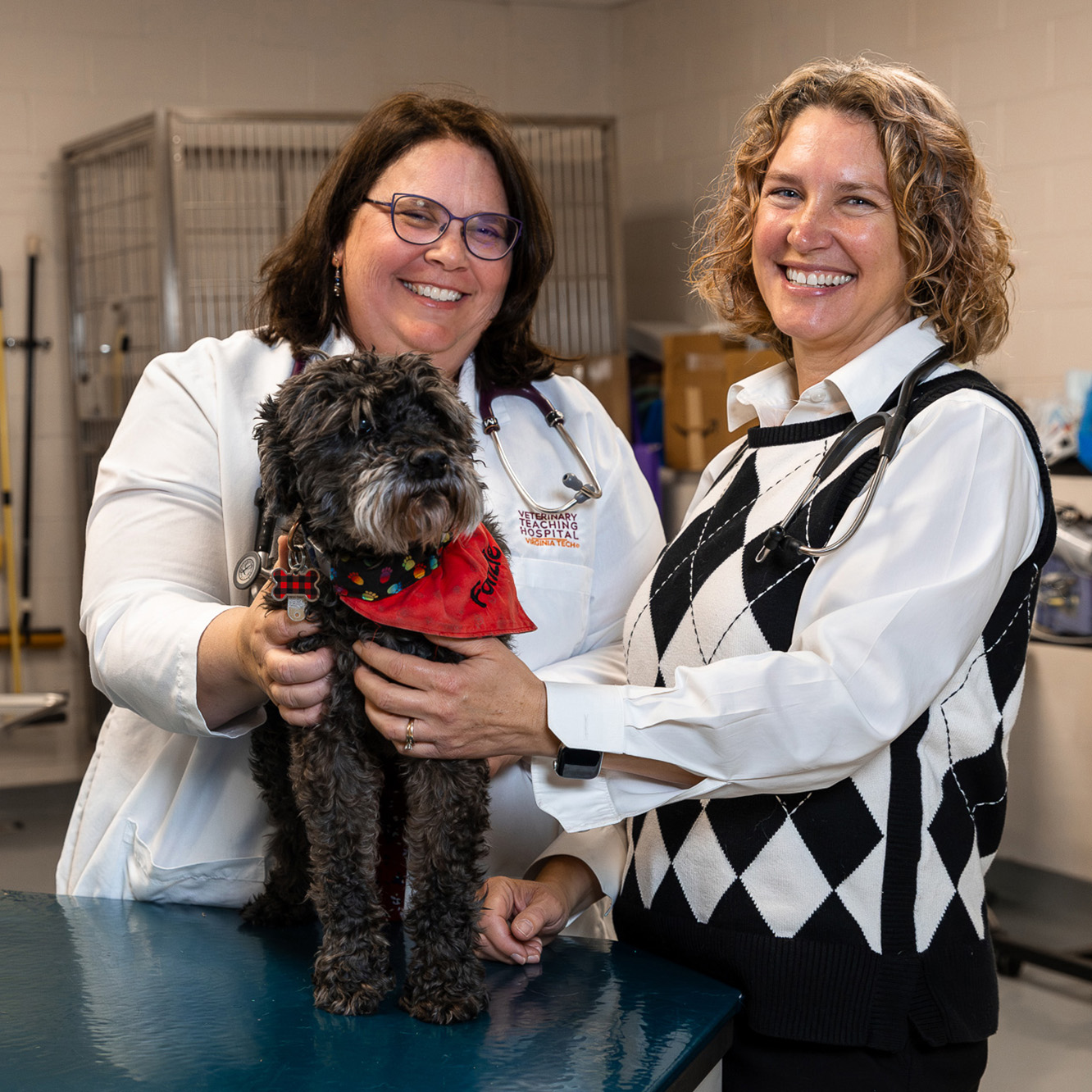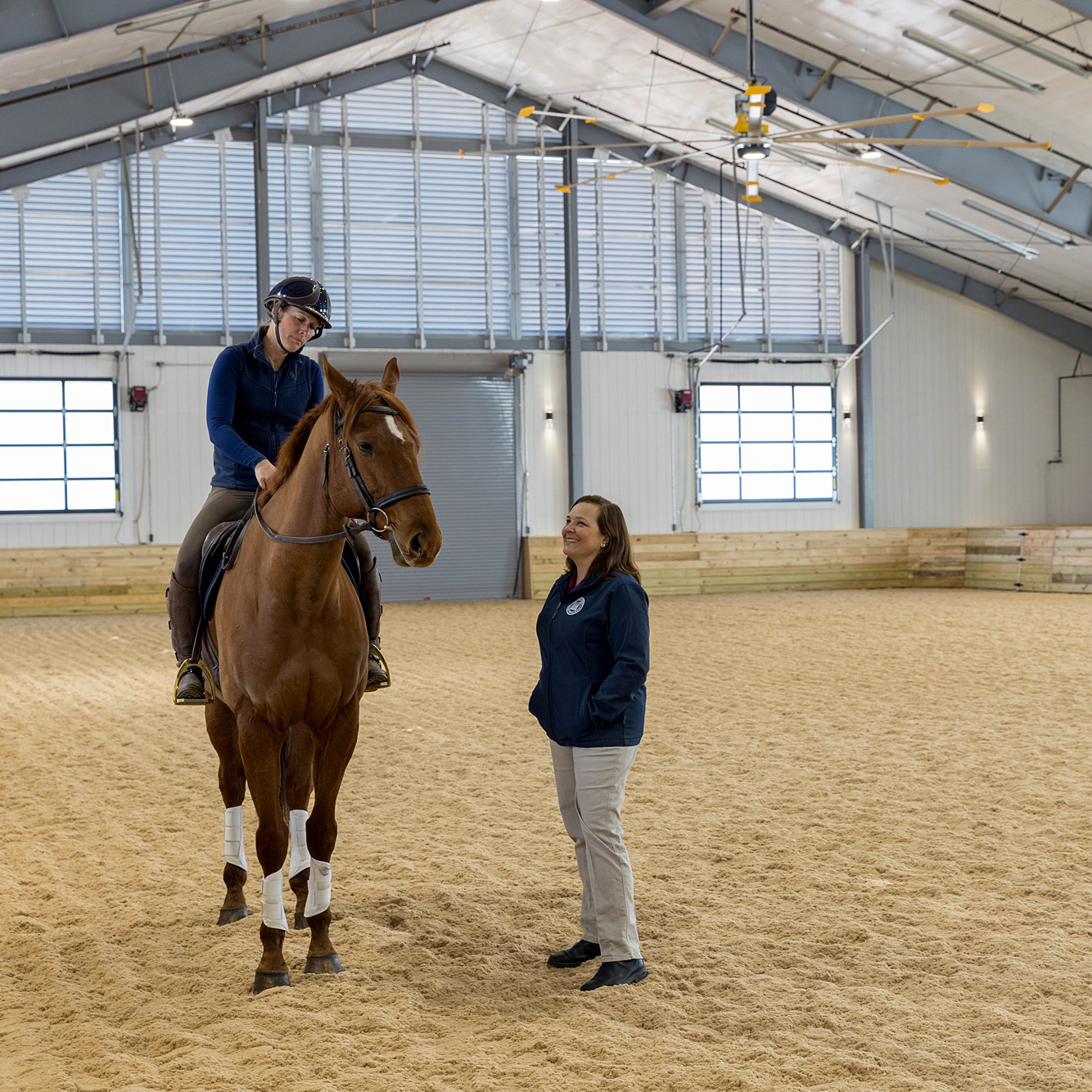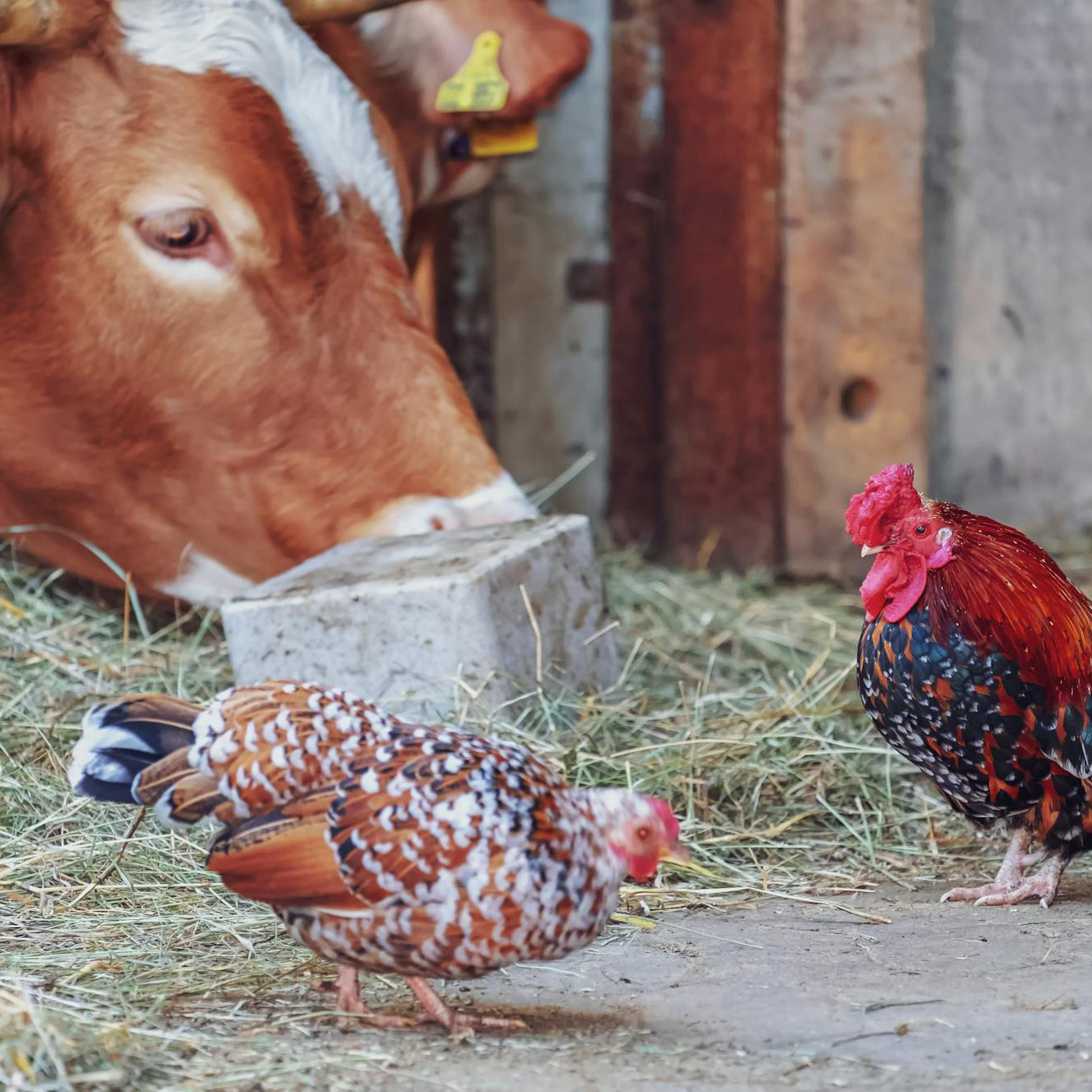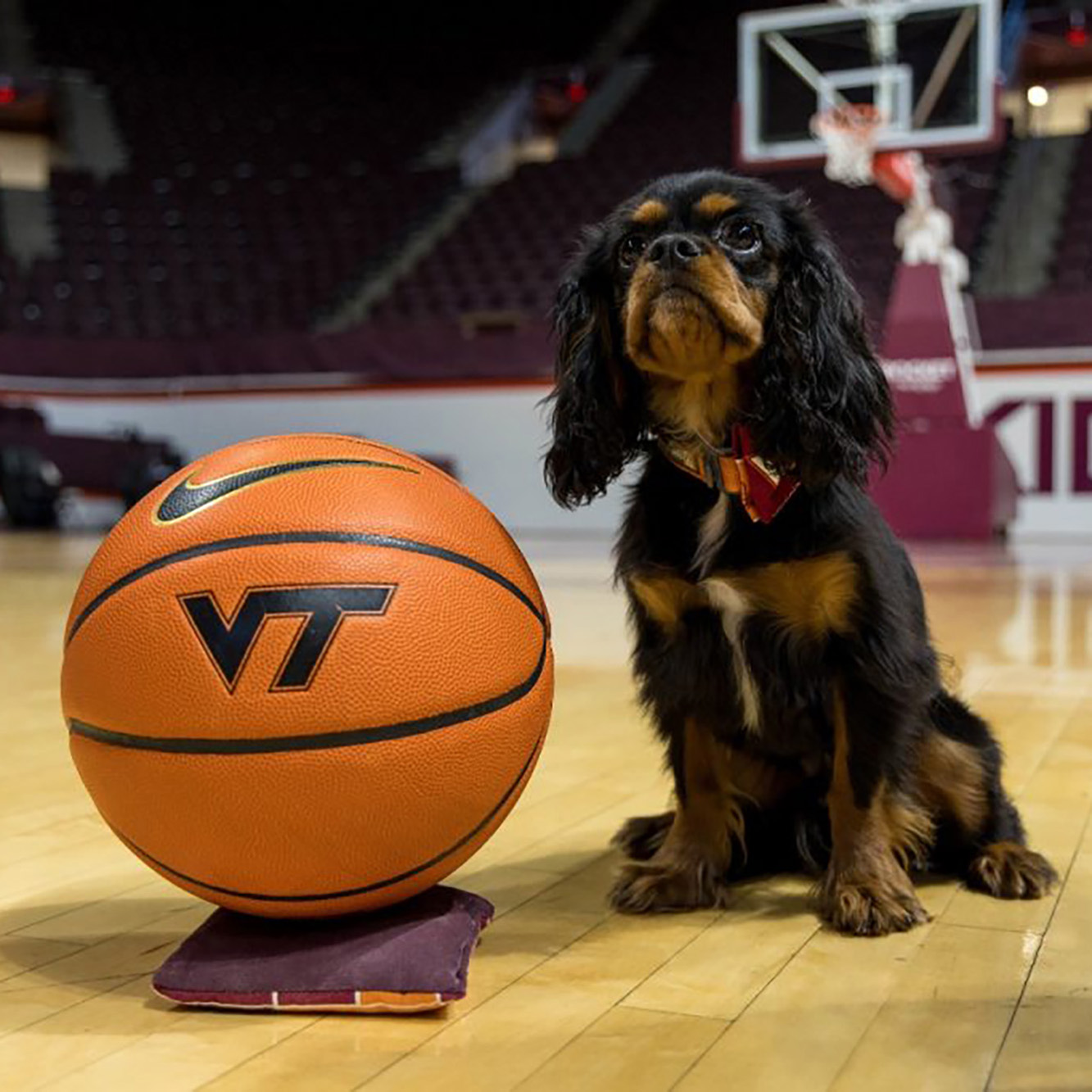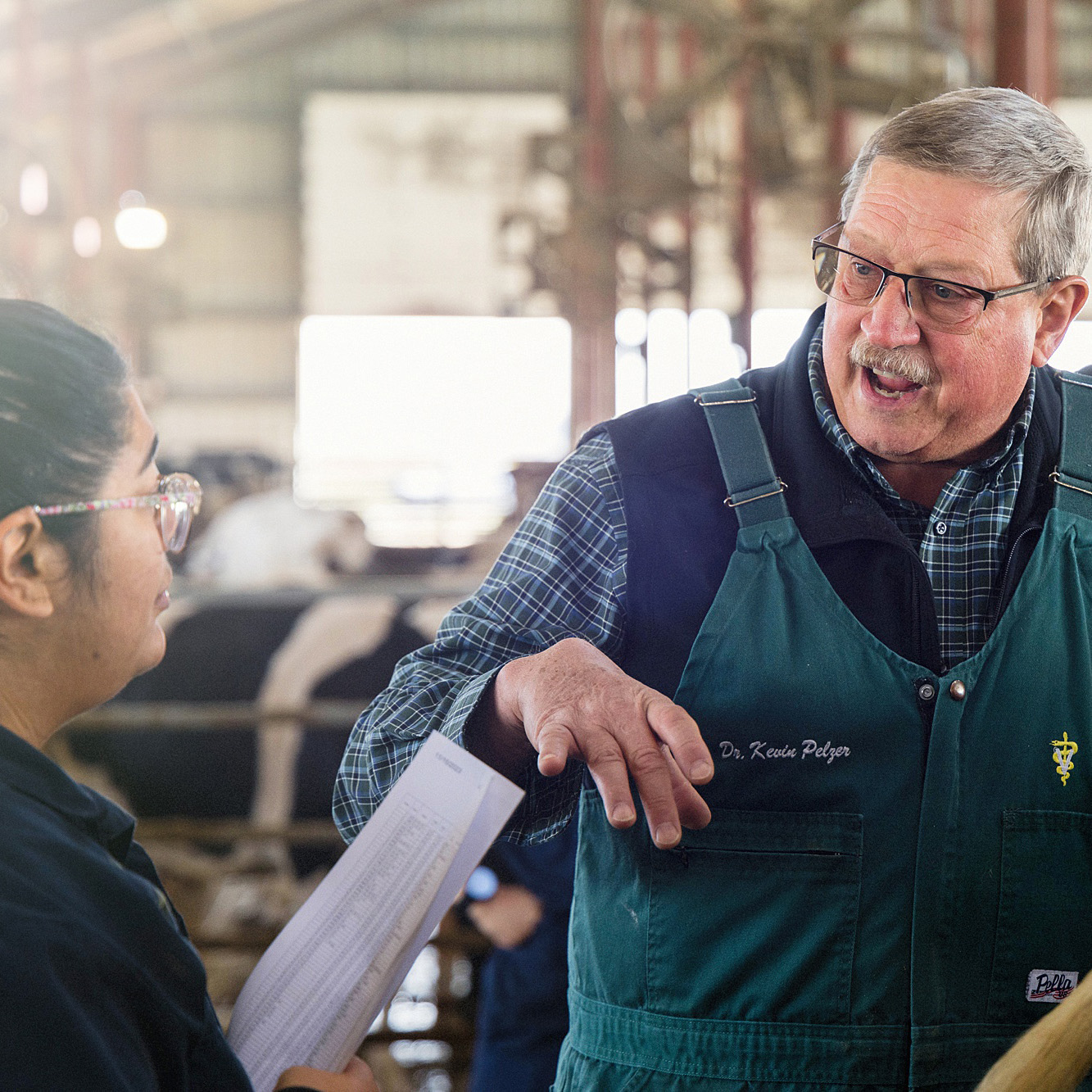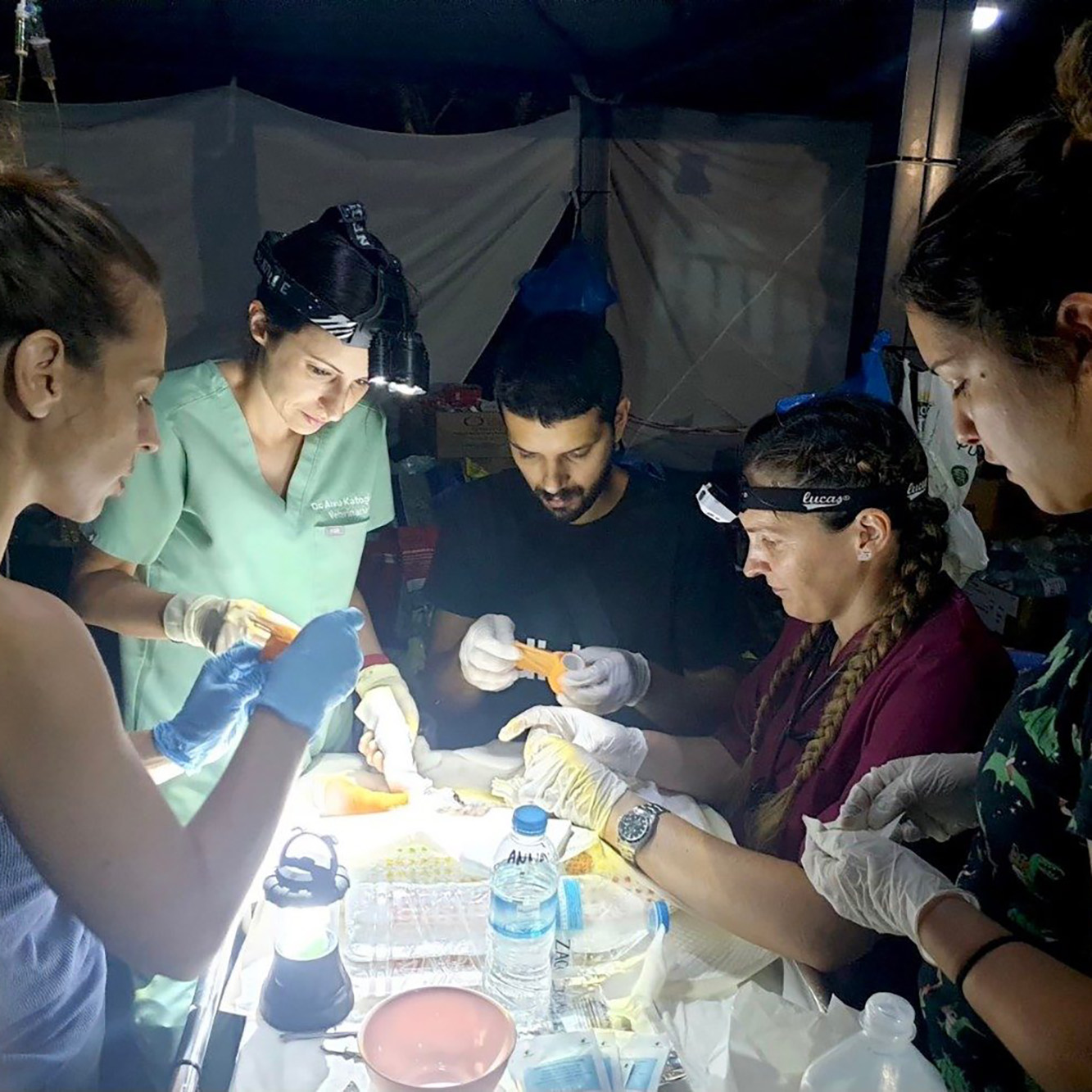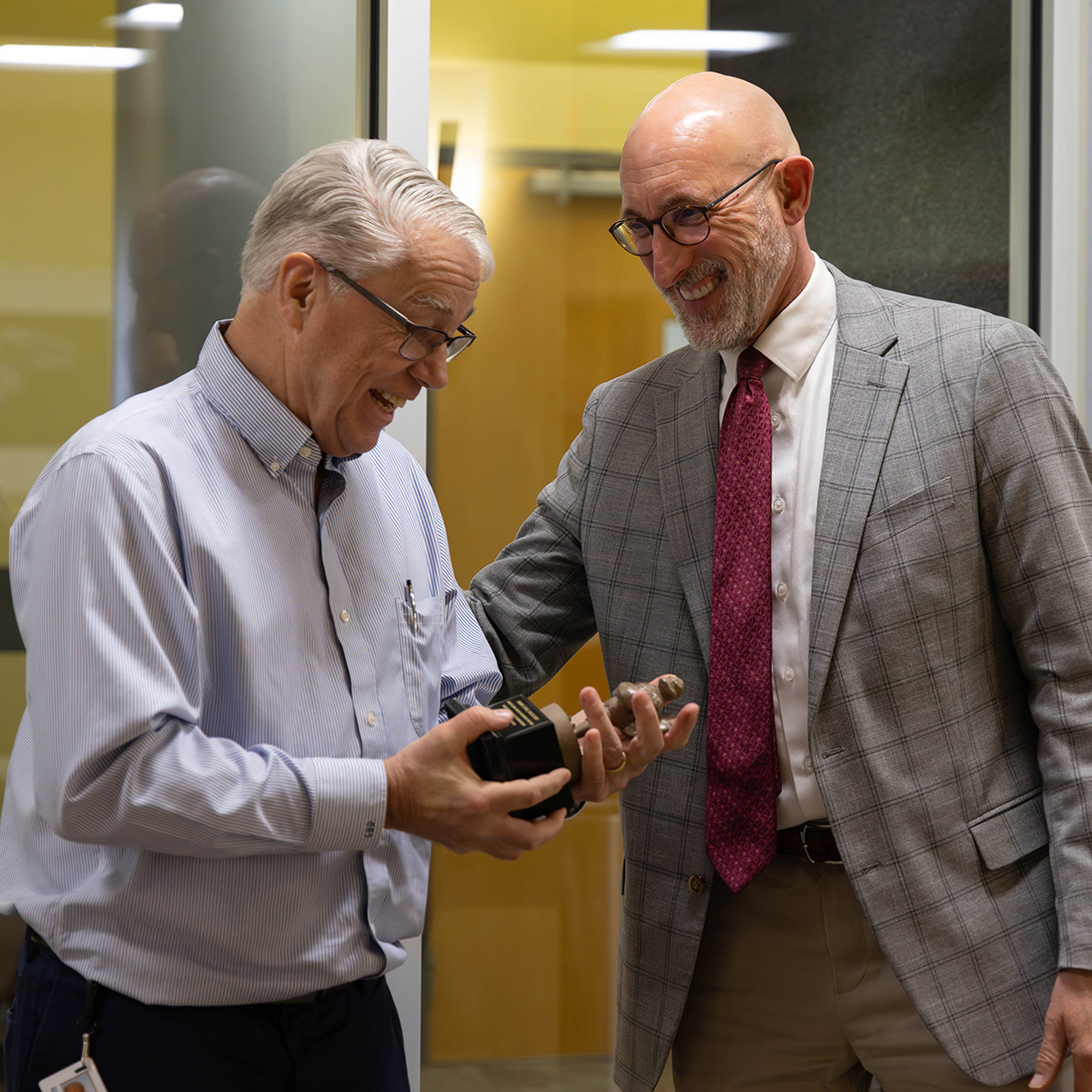College Newsletter
VMCVM Newsletter
Get updates twice a month from the Virginia-Maryland College of Veterinary Medicine.
Dear colleagues and friends,
As we celebrate the end of a year and look forward to the start of a new one, we reflect on successes and plan for new opportunities. This year, we launched our fundraising campaign for the critically important expansion and renovation of the Small Animal Veterinary Teaching Hospital. With the addition of 37,000 square feet of new space, specialty services added since the hospital was initially completed in 1987 will move into dedicated areas, while also allowing for the expansion of community practice, emergency and critical care, and rehabilitation services. As we move into newly created space, we will renovate the existing hospital to better serve the education of our students and the care of our patients. We expectantly anticipate the opening of this new addition in 2026.
Although everyone at the college is very excited about this long-awaited and vitally important expansion, we do not lose focus on our commitment to One Health, which is the dynamic interconnected and interdependent health of people, animals, and the environment. Through the efforts of our dedicated faculty, with support from staff and students, we do translational research in the area of One Health. By translational research, I mean the transfer of scientific discoveries from our laboratories and teaching hospitals in Blacksburg, Roanoke, and Leesburg to new treatments and approaches that improve the health of interconnected populations, not only in Virginia, but also across the globe.
All of this innovation would not be possible without the dedication of donors. The college’s ability to accomplish many lofty goals over the past year have been funded through philanthropic support. As you view this calendar and walk through the months to come, you will see brief summaries of amazing support and the resulting accomplishments which propel this college and our three hospital entities in our strategic efforts which are rooted in service, fueled by a passion to improve health, and focused on innovation and education. Longer versions of these stories of generosity can be found on our website.
From the creation of the first endowed scholarship to support public health students to the investment in a new underwater treadmill, donors make an impact on our college and everyone in it each and every day. This year, we had a three-fold increase in scholarship support, which will directly cause more students to graduate with less debt. As the veterinary profession continues to grapple with this serious issue, the support of generous individuals is critical to attracting and retaining the best veterinary practitioners.
Please enjoy the stories and images over the next year. May your year be filled with health and joy.
Sincerely,
Dan Givens, Dean
Dear colleagues and friends,
Against a background of ever-constant change and turbulence, 2021 has been a year of reconnecting, reshaping, and relaunching our pursuit of educational excellence, research progress, and community cohesion.
- We have effectively navigated challenges due to COVID and the necessary challenges associated with COVID mitigation protocols.
- Twenty-six student, staff, and faculty volunteers administered COVID-19 vaccines to individuals throughout the New River Valley.
- Throughout this year, we have demonstrated our steadfast commitment to hands-on experiential learning and outstanding, compassionate clinical care despite unique challenges.
- In May, our college graduated 122 DVM students, 27 MPH students, and 6 DVM/MPH students.
- Students recognized the educational excellence of faculty with multiple awards. Linda Dahlgren received the college’s award for Outstanding Faculty Mentor. Veterinary classes presented Outstanding Instructor Awards to Drs. Timothy Bolton, Fawzy Elnady, and Roger A. Ramirez-Barrios.
- The college created our first endowed scholarship for students of an underrepresented population with demonstrated financial need. This scholarship was named in honor of three of the earliest Black graduates of the college: Dr. Lynne Hoban (DVM ’86), Dr. Margie Lee (DVM ’86), and Dr. Mario Dance (DVM ’90). The college is proud to honor the accomplishments of these outstanding graduates with the creation of the Hoban, Lee, and Dance Endowed Scholarship Fund.
- During Giving Day 2021, our college received support from 244 donors giving almost $645,000 during 24 hours. This support enabled the progress of students, advancement of programs, and improvement of facilities at the college.
- With recognition of her ongoing energetic leadership, Dr. Natalia Henao-Guerrero was named department head of Small Animal Clinical Sciences.
- Our college’s research progress was in the spotlight during our 31st Annual Research Symposium. The theme of this year’s symposium was “Intersection of veterinary and human medicine to combat global diseases.”
- Our college’s research scope and impact continued to grow with annual extramural awards surpassing $10.8 million and annual extramural expenditures surpassing $11 million.
- In Fall 2021, the college welcomed 126 incoming DVM students, 55 MPH students, and 54 bachelors of science in public health (BSPH) students.
- The college hired its first director of diversity, equity, and inclusion, Garry Morgan, to advance our goals as we reaffirmed our collective responsibility in shaping the culture of our college to consistently embody our principles of community.
- The college hosted Connect 2021 as an in-person event to connect, students, mentors, prospective employers, distinguished alumni, and outstanding continuing education.
- The college hosted a six-day site visit by an eight-member team representing the accrediting body of our Doctor of Veterinary Medicine Program. While the final report resulting from this process remains pending, we have notable successes and strengths that were recognized and commended during exit briefings from the accreditation site-visit team.
The Virginia-Maryland College of Veterinary Medicine is particularly thankful for our college community's inspiring accomplishments, made feasible by our faculty and staff's shared commitment and wholehearted efforts. We are grateful for all our students, alumni, donors, referring veterinarians, and special friends of the college. We anticipate exciting advancements in the coming year as we act on our aspirations to be international leaders in veterinary medicine, biomedical sciences, and public health rooted in service, fueled by a passion to improve health, and focused on innovation and education.
Best wishes for joy-filled holidays and a wonderful new year!
Sincerely,
Dan Givens, Dean
Dear colleagues and friends,
As 2020 draws to a close, we celebrate the dedicated efforts of faculty, staff, students, alumni, donors, and referring veterinarians, which have created noteworthy accomplishments in the midst of this turbulent year.
- Having established a reputation for excellence in educating students for the many diverse opportunities available in veterinary medicine, the college's Doctor of Veterinary Medicine Program welcomed its 40th class this fall.
- For the upcoming DVM Class of 2025, more than 1,870 individuals submitted applications to yield a well-rounded community of diverse, qualified, and academically capable students selected for admission through a holistic process.
- As the college's Master of Public Health Program celebrated its 10th year of training students, 85 applications resulted in 45 newly enrolled students who will play a critical role in improving health in days and years to come.
- The college's recently accredited Bachelor of Science in Public Health has now enrolled more than 250 students, even though the program will not graduate its inaugural class until the spring of 2022.
- The college's research expenditures increased by 29.5% over the previous year to reach $9.41 million.
- Total research awards increased more than 40% from the previous year to $12.3 million, which demonstrates an impact of established collaborations and a diverse research portfolio.
- In response to a focus on the fix-the-debt initiative in 2019, DVM general scholarships in the past fiscal year experienced nearly a fourfold increase in both the annual averages of participating donors and the dollars raised.
- Enhancing its sports medicine program, the Marion duPont Scott Equine Medical Center made progress on the new Steven and Jane Hale Indoor Arena, thanks to generous support from Aimee and Frank Batten. This project is scheduled for completion before next winter.
- The college's state-of-the-art, transformative, and translational Animal Cancer Care and Research Center began seeing patients this past summer. Thanks in part to the leadership of interim director Joanne Tuohy, the center is poised for growth and impact.
- We continue to diligently pursue a path toward the expansion and remodeling of our Veterinary Teaching Hospital on the Blacksburg campus.
- Wearing personal protective equipment and adhering to rigorous biosecurity protocols, the college's inspiring faculty, staff, and students in our Veterinary Teaching Hospital, Equine Medical Center, and Animal Cancer Care and Research Center continued to educate students and provide compassionate care for our patients and their owners.
- The college's Public Health Program faculty, staff, and students have inspired us all during this challenging year. Through their roles as educators and innovators, including service in the Virginia Medical Reserve Corps and the COVID Crushers, they have consistently reminded us of our opportunities to promote, protect, and preserve the health of our communities.
As always, your support and contributions during 2020 have been critical to our success. We anticipate exciting advancements in the coming year as we act on our aspirations to be international leaders in veterinary medicine, biomedical sciences, and public health rooted in service, fueled by a passion to improve health, and focused on innovation and education.
Best wishes for joy-filled holidays and a wonderful new year!
Sincerely,
Dan Givens, Dean
Dear friends and colleagues,
In the closing weeks of 2019, we are especially grateful for our college community’s impressive achievements, made possible by the collective commitment and dedicated efforts of our faculty and staff, students, alumni, donors, referring veterinarians, and special friends of the college.
Following are just a few highlights of our remarkable accomplishments this year.
In 2019, we saw significant changes in the leadership of the college.
- Cyril Clarke, Virginia Tech’s interim executive vice president and provost since November 2017, and former dean of the college from 2013 to 2017, was named Virginia Tech’s permanent executive vice president and provost as of Jan. 1.
- After a national search, M. Daniel Givens was named the fifth dean of the college, effective June 1, 2020. The associate dean for academic affairs and a professor in the Department of Pathobiology in the College of Veterinary Medicine at Auburn University, Givens has held various roles at Auburn, including acting head of the Department of Pathobiology and interim associate dean for academic affairs, before assuming his current position in 2013.
- David Wong was appointed head of the Department of Large Animal Clinical Sciences on July 1. Previously a professor of equine medicine at Iowa State University, Wong replaced Kevin Pelzer, who was serving as interim department head.
- A professor of immunology, Xiaoping Zhu was named associate dean of the Virginia-Maryland College of Veterinary Medicine's College Park, Maryland, campus and chair of the Department of Veterinary Medicine in the University of Maryland’s College of Agriculture and Natural Resources. A longtime faculty member in the department, Zhu had been serving as interim department head since September 2017.
- Formerly with University Advancement, Sandy Torget was named the college’s director of advancement, leading our advancement team.
Along with leadership changes, the college has continued to evolve, sustaining positive, productive progress.
- Having established a reputation for excellence among prospective students, the college’s Doctor of Veterinary Medicine program, which welcomed its 39th class this fall, has ranked second nationally in the number of veterinary program applicants for five consecutive years. The Class of 2023 received 1,853 applicants for 120 available spots. With a mean GPA of 3.57, the class is academically strong with a good balance of gender (31% male) and ethnic diversity (23%).
- The college’s research program received nearly $9 million in awards for FY19 and experienced a 4.4% increase in research expenditures over FY18 — a five-year high for the college — and a 35% increase in federal expenditures over FY18.
- Gifts and donations to the college increased from $1,557,137 in FY18 to $6,111,699 in FY19. On Giving Day, Virginia Tech’s annual 24-hour fundraising event in mid-March, the college received more than $32,000, primarily targeted toward student scholarships. In October, we received an anonymous $10 million estate gift to support small animal clinical research, a significant boost to kick off our next fundraising campaign, which officially launched in October.
- The college has experienced considerable growth in its academic, clinical, and research programs in recent years, including a new Bachelor of Science in Public Health, which transferred in its first students this fall and is currently recruiting new students for the next academic year. Administered through the Public Health Program within the Department of Population Health Sciences, the degree program is positioned to evolve our overarching commitment to One Health. Professor Kerry Redican will direct this new undergraduate degree program that will be housed in a newly remodeled section of Wallace Hall.
- A state-of-the-art clinical and research hub, the Comparative Oncology Research Center, under construction on the Virginia Tech Carilion Health Sciences Campus in Roanoke, Virginia, is on track to begin seeing patients in June 2020. As the new home of the Veterinary Teaching Hospital’s medical oncology service, the center will be the region’s only radiation oncology service for pets. Joining the oncology team this year were Joanne Tuohy, a surgical oncologist who will develop CORC’s surgery service; and Ilektra Athanasiadi, a radiation oncologist who will oversee CORC’s linear accelerator.
- We continue to move toward the expansion and remodeling of the Veterinary Teaching Hospital on the Blacksburg campus. In light of the consistently high quality of care provided by our faculty, staff, and students, VTH client feedback surveys — which are gathered and reported monthly by CalPro Research — routinely place us in the top tier among our peer referral and primary care centers. We deeply appreciate the hard work and dedication of our Veterinary Teaching Hospital and Equine Medicine Center faculty and staff who put in long hours, provide compassionate care to our patients and their owners, and serve as great role models for our students.
- Celebrating its 35th anniversary, the Marion duPont Scott Equine Medical Center in Leesburg, Virginia, held a groundbreaking in early November for the newest addition to its hospital campus: the Steven and Jane Hale Indoor Arena. Marking the final component of EMC’s “New Horizon” operational plan, the new facility will advance the center’s ability to treat sport horses.
- The college’s alumni and friends and our hospitals’ grateful clients continued to provide critical support to fund facility improvements, groundbreaking clinical research, and state-of-the-art equipment, allowing our college to advance knowledge and deliver innovative treatments that improve animal lives.
- Sponsored by the college’s Alumni Society, our first-ever Continuing Education Conference and Alumni Reunion Weekend was held in August, welcoming alumni from all years and programs for a day of CE and activities. The support and engagement of our alumni play a crucial role in advancing the college and shaping the next generation of students and professionals. During the weekend’s activities, Bill Tyrrell (DVM ’92) received our Lifetime Achievement Alumni Award, and Claire Simeone (DVM '11) received our Outstanding Recent Alumni Award.
- The college hosted its fifth annual VetTRAC Summer Program, a week of tours, lectures, experiential learning, and career exploration for students from underrepresented populations interested in veterinary medicine. This successful enrichment program is one of three initiatives developed by the college as part of InclusiveVT, Virginia Tech’s approach to diversity and inclusion.
As always, your support and contributions during 2019 have been vital to our success. Looking ahead, we anticipate another outstanding year of learning, service, and discovery that benefits the well-being of animals, people, and communities.
Best wishes for a happy holiday and bountiful new year!
Sincerely,
Gregory B. Daniel, Interim Dean
Dear friends and colleagues,
As 2018 comes to a close and we reflect on the accomplishments of our college community this year, we are mindful that these achievements would not be possible without the collective commitment and efforts of faculty and staff, students, alumni, donors, referring veterinarians, and friends of the college. Here are a few highlights of what we have accomplished together.
- The college maintained its position as one of the top-ranked colleges in the nation in the number of applications for veterinary program admission. We received 1,656 applications for 120 positions available in the Class of 2022 — the second largest applicant pool in North America for the fourth year in a row.
- In 2018, the college’s Small Animal Hospital marked 30 years of accreditation with the American Animal Hospital Association, the only organization in the United States and Canada that accredits companion animal hospitals based on standards of veterinary excellence that go above and beyond state regulations.
- Client feedback surveys using CalPro Research benchmarks our Veterinary Teaching Hospital in Blacksburg with our peer referral centers. The results in 2018 continue to show our hospital among the top tier of referral and primary care centers with many clients commenting on the high-quality, professional, and compassionate care of our faculty, staff, and students.
- The generosity of the college’s alumni and friends and our hospitals’ grateful clients provided critical support this year to fund facility improvements, groundbreaking clinical research, and state-of-the-art equipment, allowing our college to expand knowledge and deliver innovative treatments that improve animal lives.
- The new Virginia Tech Bachelor of Science in Public Health, approved by the State Council of Higher Education for Virginia in September and added as an accredited degree by the Council on Education for Public Health (CEPH) in October, will be offered through the public health program in the college’s Department of Population Health Sciences. The program will admit its first cohort of students in fall 2019. In addition, the Master of Public Health Program received continuing accreditation from CEPH through December 2025.
- The college maintained its position as one of the top-ranked colleges in the nation in the number of applications for veterinary program admission. We received 1,656 applications for 120 positions available in the Class of 2022 — the second largest applicant pool in North American for the fourth year in a row.
- The college’s research program received more than $10 million in sponsored program awards for FY18 and saw a 30 percent increase in awards and a 75 percent increase in research expenditures from commercial sponsored programs between FY18 and FY17.
- The college’s Comparative Oncology Research Center (CORC), currently under construction on the Virginia Tech Carilion Health Sciences and Technology Campus in Roanoke, will serve as a center of excellence for comprehensive animal cancer care, research, and learning. Scheduled to begin seeing patients in spring 2020, CORC will accommodate the relocation and expansion of the medical oncology service from the Veterinary Teaching Hospital in Blacksburg as well as the region’s only radiation oncology service for pets.
- The college and Alumni Society hosted festive weekends this fall to celebrate alumni reunions for DVM classes as well as the first annual alumni weekend for the MPH program. We are thankful for the continued engagement and support of our alumni and appreciate the critical role they play in advancing the college and shaping the next generation of students and professionals.
- The college hosted its fourth annual VetTRAC Summer Program, which featured a week of tours, lectures, and hands-on experiences for students from underrepresented populations who are interested in veterinary medicine. The program is one of three initiatives developed by the college as part of InclusiveVT, Virginia Tech’s approach to diversity and inclusion.
- This year, the college’s DVM Educational Debt Task Force, a group that combines faculty from the college with outside advisors who lend expertise on a variety of debt-reduction strategies, issued a final report that contains recommended actions for addressing the debt problem and establishing metrics to measure progress.
We thank the members of our college family for their support and contributions that made 2018 a successful year, and we look forward to working together to build on this success in 2019.
Have a happy holiday and a prosperous new year!
Sincerely,
Gregory B. Daniel, Interim Dean
2017
Dear friends and colleagues,
In my new role as interim dean, I have the privilege of sharing with you a few highlights of the many accomplishments of our college community this year. These achievements would not be possible without the collective commitment and efforts of faculty and staff, students, alumni, donors, referring veterinarians, and friends of the college.
- The college embarked on an exciting initiative to develop a Comparative Oncology Research Center (CORC) on the Virginia Tech Carilion Health Sciences and Technology Campus in Roanoke, Virginia. Reflecting the college's commitment to improving animal and human lives, CORC will serve as an innovative model for accelerating the development of diagnostic prodedures and treatments for cancer in pets and people.
- The college maintained its position as one of the top-ranked colleges in the nation in the number of applications for veterinary program admission. We received more than 1,600 applications for 120 positions available in the Class of 2021 — the second largest applicant pool in North American for the third year in a row.
- The Virginia Tech Board of Visitors approved a resolution to create a new Bachelor of Science in Public Health through the college's Department of Population Health Sciences.
- John Rossmeisl, professor of neurology and neurosurgery, is among the members of an interdisciplinary research team from Virginia Tech and Wake Forest University that received a $9.2 million NIH grant to continue their promising research targeting glioblastoma, the most common and deadliest form of brain cancer in adults.
- The generosity of the college's alumni and friends and our hospitals’ grateful clients provided critical support this year to fund facility improvements, groundbreaking clinical research, and state-of-the-art equipment, allowing our college to expand knowledge and deliver innovative treatments that improve animal lives.
- The college and Alumni Society hosted a festive weekend this fall to celebrate reunions for all DVM program milestone classes. We are thankful for the continued engagement and support of our alumni and appreciate the critical role they play in advancing the college and shaping the next generation of students and professionals.
- The college hosted its third annual VetTRAC Summer Program, which featured a week of tours, lectures, and hands-on experiences for students from underrepresented populations who are interested in veterinary medicine. The program is one of three initiatives developed by the college as part of InclusiveVT, Virginia Tech’s approach to diversity and inclusion.
- The college community continued taking action to address the issue of student educational debt. This year, the college’s Executive Board approved a new initiative to develop a task force charged with drafting an action plan for addressing this problem and establishing metrics to measure progress. In addition, the college’s chapter of the Student American Veterinary Medical Association organized and sponsored a week-long series of events to address this issue and enhance student financial literacy.
- The Advisory Board for the college's Public Health Program held its innaugural meeting this fall. We are grateful for the critical role the board will play in guidance, advocacy, and identifying resources to support the program.
- Virginia Tech Animal Laboratory Services (ViTALS), our full-service veterinary diagnostic laboratory, became the first in Virginia to earn full accreditation through the American Association of Veterinary Laboratory Diagnosticians.
We thank the members of our college family for their support and contributions that made 2017 a successful year, and we look forward to working together to build on this success in 2018.
Have a happy holiday and a prosperous new year!
Sincerely,
Gregory B. Daniel, Interim Dean
2016
Dear friends and colleagues,
As we come to the end of 2016, we take this opportunity to look back on the many accomplishments achieved this year.
A few highlights:
- With the arrival of the Class of 2020, we launched a new Doctor of Veterinary Medicine curriculum that integrates the basic and clinical sciences, incorporates team-based learning, allows for early entry into the clinics, and switches to a pass/fail grading system.
- The college maintained its position as one of the top-ranked colleges in the nation in the number of applications for admission. We received 1,400 applications for 120 positions available in the Class of 2020 — the second largest applicant pool in North American for the second year in a row.
- X.J. Meng, University Distinguished Professor of Molecular Virology, was elected to the National Academy of Sciences, one of the highest honors given to a scientist in the United States. Meng also helped organize the 2016 annual meeting of the American Society for Virology, which brought 1,300 scientists to Virginia Tech.
- We became the first college at Virginia Tech to implement the new advancement model, which brings together development, communications, and alumni relations under the leadership of Alison Wainwright Davitt, our new assistant dean of advancement.
- S. Ansar Ahmed, who previously served as head of the Department of Biomedical Sciences and Pathobiology, was named associate dean for research and graduate studies at the college.
- The Department of Population Health Sciences continued to make progress in expanding One Health initiatives, including design of a new undergraduate program in public health, which has been submitted to the university for approval. We also welcomed Laura Hungerford as the new department head.
- The Marion duPont Scott Equine Medical Center in Leesburg made progress on its New Horizons initiatives, launched a full-time farrier service, and debuted a new high-definition CT scanner for standing horses.
- Our clinical research program continued to expand with two new members of the Collaborative Research Network and new clinical trials in the areas of cardiology, oncology, and medicine.
- Virginia Tech Animal Laboratory Services (ViTALS), our full-service veterinary diagnostic laboratory, become the first in Virginia to earn provisional accreditation through the American Association of Veterinary Laboratory Diagnosticians.
- Neuroscientist Michelle Theus and her colleagues received a five-year, $1.7 million grant from the National Institutes of Health to study traumatic brain injury.
- Recent alumna Betsy Schroeder (DVM ’16) received a prestigious Epidemic Intelligence Service Fellowship through the U.S. Centers for Disease Control.
- Our veterinary students hosted the college’s inaugural Wellness Week with workshops, lectures, and activities organized by the Student Chapter of the American Veterinary Medical Association and several other student clubs.
- The college gave undergraduate students from underrepresented populations a peek into the veterinary profession through the week-long VetTRAC Summer Program.
- We continued to upgrade our facilities in both Blacksburg and Leesburg. Highlights include new collaborative learning technology in instructional spaces, an expanded anatomy cooler, and renovated research spaces for the Center for Molecular Medicine and Infectious Diseases. We also opened a new equine therapeutic podiatry facility at the Veterinary Teaching Hospital.
- Last but not least, we graduated the first cohort from Puppy University, a partnership between the veterinary college and Saint Francis Service Dogs in Roanoke to prepare puppies for service dog training.
These accomplishments would not be possible without the contributions of faculty and staff, students, alumni, donors, referring veterinarians, and friends of the college, and we thank them for their support. Our collective effort made 2016 a successful year, and we will build on this success in 2017.
Have a happy holiday and a prosperous new year!
Sincerely,
Cyril Clarke, Dean
2015
Dear friends and colleagues,
As we come to the end of 2015, we take this opportunity to look back on the many accomplishments achieved this year.
A few highlights:
- The college earned full accreditation by the American Veterinary Medical Association’s Council on Education, the official accrediting body responsible for assuring that veterinary education meets the high standards expected by students, parents, the public, and the profession.
- The college maintained its position as one of the top-ranked colleges in the nation in the number of applications for admission. We received over 1,200 applicants for 120 positions available in the Class of 2019 — the second-largest applicant pool in North America. More than 30 percent of this class are underrepresented racial and ethnic minorities.
- Students in the Class of 2015 achieved a 99 percent pass rate on the North American Veterinary Licensing Examination (NAVLE), thus maintaining for at least seven consecutive years an excellent standard of performance.
- After approving a framework for comprehensive revision of the DVM curriculum last year, faculty progressed to the next step involving development of new, integrated courses.
- The Veterinary Teaching Hospital’s Small Animal Clinical Services achieved reaccreditation from the American Animal Hospital Association. The hospital’s Small Animal Community Practice also earned low-stress and cat-friendly practice certifications. Terry Swecker was appointed hospital director, and Ian Herring and Lara Bartl were appointed assistant directors.
- We relaunched the Marion duPont Scott Equine Medical Center to achieve a more sustainable clinical practice and named Michael Erskine as the new center director.
- We partnered with the Via College of Osteopathic Medicine to advance collaborative One Health research and upgrade research laboratories at the college’s Center for Molecular Medicine and Infectious Diseases.
- The Department of Population Health Sciences made progress in expanding One Health initiatives, including planning for a new undergraduate program in public health. Housed within the department, the Center for Public and Corporate Veterinary Medicine is now also responsible for coordinating the college’s international programs.
- Craig Beyrouty was welcomed as the new dean of the University of Maryland College of Agriculture and Natural Resources, which houses our Department of Veterinary Medicine on the College Park campus.
- The college held the first Veterinary Medicine Science Camp, a week of tours, lectures, and hands-on experiences for underrepresented students interested in a veterinary career.
- The college launched a puppy raiser program with Saint Francis Service Dogs, a Roanoke-based nonprofit that trains service dogs for children and adults with disabilities.
- Bess Pierce, director of the Center for Human Animal Relationships, received the 2015 Bustad Companion Animal Veterinarian of the Year Award, the highest veterinary honor in the nation for work in the human-animal bond.
- Third-year veterinary student Anna Katogiritis had a rare opportunity to volunteer with the Jane Goodall Institute’s Tchimpounga Chimpanzee Rehabilitation Center in Congo this summer.
- Parasitologist Anne Zajac’s research on Lyme disease in the New River Valley received considerable local and regional attention. Scholarship published by immunologist Ansar Ahmed on the role of gender in development of autoimmune diseases was selected for special recognition by reputable scientific journals. These were just two of several successful research programs in Blacksburg, Leesburg, and College Park that made significant contributions to biomedical sciences and translational medicine.
Our students, faculty, staff, alumni, donors, and friends across the region have continued to advance the college and its goals in 2015. Our work would not be possible without their time and attention, and we thank them for their support as we look to build on these successes in 2016.
Enjoy the well-deserved break and have a happy holiday and a prosperous new year!
Sincerely,
Cyril Clarke, Dean
2014
Dear friends and colleagues,
As we come to the end of 2014, we take this opportunity to look back on the many accomplishments achieved this year.
A few highlights:
- Students in the Class of 2014 achieved a 100% pass rate on the North American Veterinary Licensing Examination (NAVLE), thus maintaining for at least six consecutive years a standard of performance that exceeds the national average.
- The AVMA Council on Education conducted a comprehensive review of the college in early October. A detailed self-study was drafted and approximately $1 million was invested in deferred maintenance projects in the teaching hospital to prepare for the review. The preliminary report of evaluation was positive and continued full accreditation is anticipated.
- Over 1,200 applications were received for the 120 positions available in the DVM Class of 2019. We maintained our position as one of the top-ranked colleges in the nation in the number of applications for admission.
- Leadership of the Center for Public and Corporate Veterinary Medicine was transferred to the Blacksburg campus and further development of the Center is in progress at both Virginia Tech and the University of Maryland.
- Faculty approved a framework for comprehensive revision of the DVM curriculum.
- Seven new academic faculty joined the college in the areas of public health, large animal surgery, anesthesiology, public and corporate veterinary medicine, and small animal surgery.
- A new student lounge and library were constructed, thus completing the remodeling project designed to create a contiguous commons-cafeteria-student lounge-library space in close proximity to student classrooms and the teaching hospital.
- Forty-four new faculty offices were constructed in an old “cube-farm” office space. Over 90% of academic faculty are now accommodated in appropriate offices, which brings the college closer to its goal of replacing all faculty office cubicles.
- Faculty in our Department of Population Health Sciences relocated from another building on campus to new offices in our main facility on Duck Pond Drive.
- A comprehensive business review of the Equine Medical Center was conducted by an external equine practice management consultant and an operational plan is in the initial stages of implementation. This “re-launch” of the EMC creates an opportunity to secure a sustainable financial future that complements the missions of other clinical service facilities.
- Virologist Dr. X.J. Meng was recognized as a Fellow of the National Academy of Inventors.
- MPH student Ashley Francis served as the graduate student representative on the Virginia Tech Board of Visitors.
Many of these accomplishments would not have been possible without the mentorship of faculty and staff, and the support of alumni, referring veterinarians, and other friends of the college who contributed time, attention, and financial resources. Thank you!
We look forward to building on our successes in 2015. But before we do, I encourage you to take an opportunity during the holidays for a well-deserved break and spend time with friends and family.
Wishing you a safe and enjoyable holiday and a prosperous new year!
Sincerely,
Cyril Clarke, Dean
2013
Dear friends and colleagues,
As we come to the end of 2013, I take this opportunity to look back on the many accomplishments at the Virginia-Maryland Regional College of Veterinary Medicine. Our students, faculty, staff, alumni, and partners across the region have continued to advance the college and its goals.
A few highlights:
- Students in the Class of 2013 achieved a 97 percent pass rate on the North American Veterinary Licensing Examination (NAVLE), thus maintaining for at least five consecutive years a standard of performance that exceeds the national average.
- Over 1,400 applications were received for the 120 positions available in the DVM Class of 2018, an increase of 12.7 percent compared with last year.
- Following the recent increase in veterinary student enrollment, 11 new academic faculty joined the college during the 2012-2013 academic year.
- A small animal clinic was opened in Roanoke in cooperation with local veterinarians. This referral center complements the Veterinary Teaching Hospital, which continued to grow in caseload. Ninety-seven percent of referring veterinarians rated the quality of service provided by the hospital as either Good (19 percent) or Excellent (78 percent).
- Remodeling of the Commons/Cafeteria was completed.
- The Master of Public Health program attained accreditation from the Council on Education for Public Health.
- Dr. X.J. Meng was appointed to the position of University Distinguished Professor.
- Funded research grants awarded to college investigators located in Blacksburg at Virginia Tech and in College Park at the University of Maryland totaled over $7.5 million during the 2012-2013 academic year.
These accomplishments attest to a program that is serious about achieving the educational, research, and service goals of a land-grant institution. They would not have been possible without the support of alumni, referring veterinarians, friends who donated financial resources, and the engagement of regional veterinary medical associations.
Next year, we will have an opportunity to continue building on the successes of 2013.
Wishing you a safe and enjoyable holiday and an accomplished new year,
Cyril Clarke, Dean



